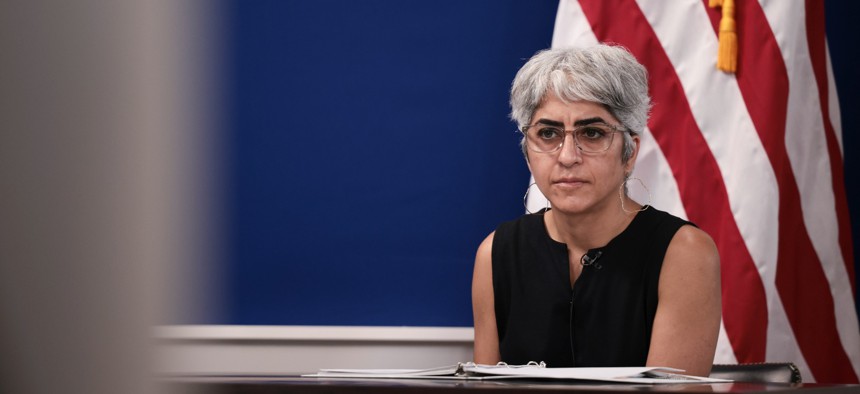OPM's Ahuja Gets an Earful From Agencies Over Enhanced Pay for Cyber Talent

OPM Director Kiran Ahuja, shown here at a White House event held last October, is facing pressure from federal HR officials to match enhanced pay and hiring flexibilities offered by a select few agencies. Anna Moneymaker/Getty Images
The Director of the Office of Personnel Management is navigating the intense competition among federal agencies for in-demand cybersecurity workers.
HERSHEY, PA. – Federal human resources officials are feeling "true angst" about the uneven landscape of cybersecurity hiring and pay privileges across government and subsequent poaching of cyber pros across agency lines, said Kiran Ahuja, the director of the Office of Personnel Management, on Monday.
"We aren't just competing with the private sector," she said during a plenary address at ACT-IAC's Imagine Nation conference on Monday. "Oftentimes, we are competing with ourselves."
Ahuja pointed to the Department of Homeland Security in particular, which launched its Cyber Talent Management System in November 2021. That system, which was mandated by Congress and took seven years to launch, gives broad new hiring authorities and pay flexibilities to DHS that most agencies can't match.
As of August, DHS was falling well short of its goal to use CTMS to make 150 selections for new hires by the end of September, with only around 21 accepted job offers at that point.
Still, Ahuja said that "there has been so much incoming to OPM on this issue."
"The inequities that exist in the hiring of cyber and IT talent across the federal government, the loss of people from one agency to another, it is the true angst that we hear from our [Chief Human Capital Officers] community," said Ahuja. "DHS can pay for more for cyber talent, leaving other agencies at a competitive disadvantage."
Currently, OPM is working on a cyber talent strategy to be released in the coming year and feature pay, position descriptions and flexibilities, Ahuja said.
That system will likely incorporate some of the same flexibilities enjoyed by DHS and by the Department of Defense, which has a similar system. Ahuja told lawmakers at a House Oversight committee hearing in July that the tools and strategies used to hire in-demand talent need to be consistent across government.
Ahuja told FCW via email regarding the reaction she's seen to the DHS system that "agencies see the possibilities of having an alternative system that would allow them to stay competitive with other industries when competing for cyber talent."
One potential tool is a special salary rate, which "will basically unify and lift up these salaries across the federal government," she said in an emailed response to questions from FCW.
A proposal for a special rate has already been submitted to OPM by the Departments of Veterans Affairs, Health and Human Services, State, Energy and the Cybersecurity and Infrastructure Security Agency "to establish higher rates of pay for federal Information technology management employees with a strong focus on those at entry levels," Ahuja said via email.
Ahuja said that OPM is still evaluating the proposal for governmentwide coverage and doesn't have a timeframe for a decision yet.
Lots of jobs and few qualified candidates
Federal agencies are indeed operating within a tight market. Recently released data put the number of cyber jobs listed in the U.S. between October 2021 and last month at 769,736.
OPM isn't the only agency looking at addressing this gap. The team of National Cyber Director Chris Inglis is also working on a cyber talent plan that will look beyond the federal government alone to address the shortage of cyber workers writ large and encourage more education and awareness about cyber across the public.
In September, a top White House cyber official told FCW that Ahuja's forthcoming strategy is part of this broader, forthcoming workforce plan from the Office of the National Cyber Director.
One snag for using the DHS system across government is that it relies on excepted service rules, with hiring, firing and pay practices that separate it from traditional civil service human resources.
Some, including the successor of the Cyberspace Solarium Commission, have recommended that Congress expand excepted service authorities for cyber talent across the government.
However, Ahuja is not sold on the idea of building a governmentwide cyber and tech workforce outside the existing civil service structure.
"We believe that there is a path forward with greater flexibility to compete for talent but also staying within the competitive service," Ahuja told FCW in the emailed response.
"OPM has already put a number of legislative proposals forward that would support this community and mirror many of the flexibilities in these other systems, but we understand that more work is needed," she said. "OPM is working towards an enterprisewide solution that would incorporate key aspects of the different systems into a governmentwide cyber strategy to close the gap in the different systems."






